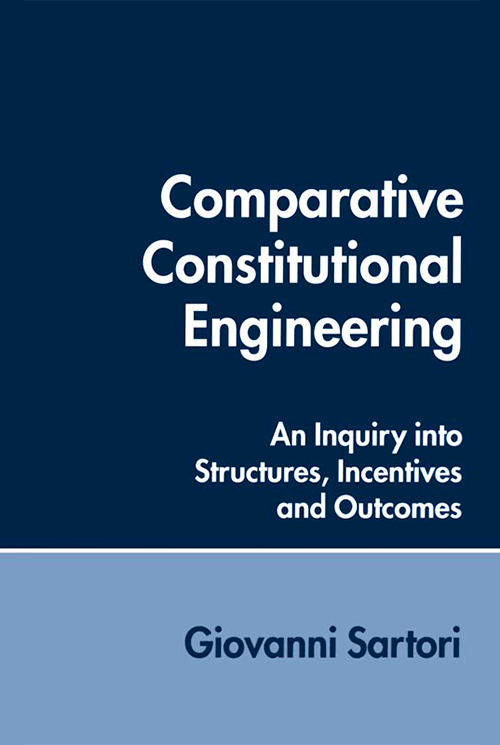SFOGLIA TUTTI I LIBRI
Comparative Constitutional Engineering
Abstract
A path-breaking, highly innovative comparative study in state building by a major political scientist, Comparative Constitutional Engineering examines in detail the variant forms of democratic government in their merits, failures and attendant problems. Sartori begins with a discussion of electoral systems, arguing against the conventional wisdom that their 'influence' cannot be predicted, cleaning up their classification, and bringing back into prominence the double-ballot formulas. In the process he disputes the view that proportional representation is always best and leads to 'consensus democracy'. He then turns his analytic eye to a comparative assessment of presidential versus semi-presidential systems. He continues with a discussion of the varieties of formulas that are categorized, somewhat misleadingly, as parliamentary systems, probing the conditions that affect their respective performances. He concludes with a proposal, outlined in detail, for a new type of government: alternating presidentialism. Underlying this proposal is Sartori's awareness of the need to combine strong parliamentary control with efficient government. To combat the paralysis to which Western politics are prone, he suggests a legislative process that allows neither parliamentary obstructionism nor government by decree. Such a proposal will be of interest to a number of Latin American countries (all the way from Mexico to Brazil) and is of particular relevance for dysfunctional parliamentary systems (such as those of Italy and Israel) as well as the post-communist countries.
Info
Anno: 1994
Autore: Giovanni Sartori
Editore: New York University Press
Città: New York
Pagine: 219
Note: México, Fondo de Cultura, 1995, 1996, 1999, 2a ed. ampliata 2001, 2002, 2003; Cile, 1995; Bologna, Il Mulino, 1995, 1996, 1998, 4a ed. 2000, 5a ed. 2004; Brasile, Editora Universidade de Brasilia, 1997; Turchia, Ankara, Turkish Democracy Foundation, 1997; Taiwan, 1998; Repubblica Ceca, Praga, 2001; Giappone, Waseda University Press, 2000; Lituania, 2001; Romania, Editura Mediterana, 2002; Ungheria, Budapest, Akadémiai Kiadò, 2003. RistampA: London, Macmillan, 1994, 2a ed. 1997
Info
Anno: 1994
Autore: Giovanni Sartori
Editore: New York University Press
Città: New York
Pagine: 219
Note: México, Fondo de Cultura, 1995, 1996, 1999, 2a ed. ampliata 2001, 2002, 2003; Cile, 1995; Bologna, Il Mulino, 1995, 1996, 1998, 4a ed. 2000, 5a ed. 2004; Brasile, Editora Universidade de Brasilia, 1997; Turchia, Ankara, Turkish Democracy Foundation, 1997; Taiwan, 1998; Repubblica Ceca, Praga, 2001; Giappone, Waseda University Press, 2000; Lituania, 2001; Romania, Editura Mediterana, 2002; Ungheria, Budapest, Akadémiai Kiadò, 2003. RistampA: London, Macmillan, 1994, 2a ed. 1997

